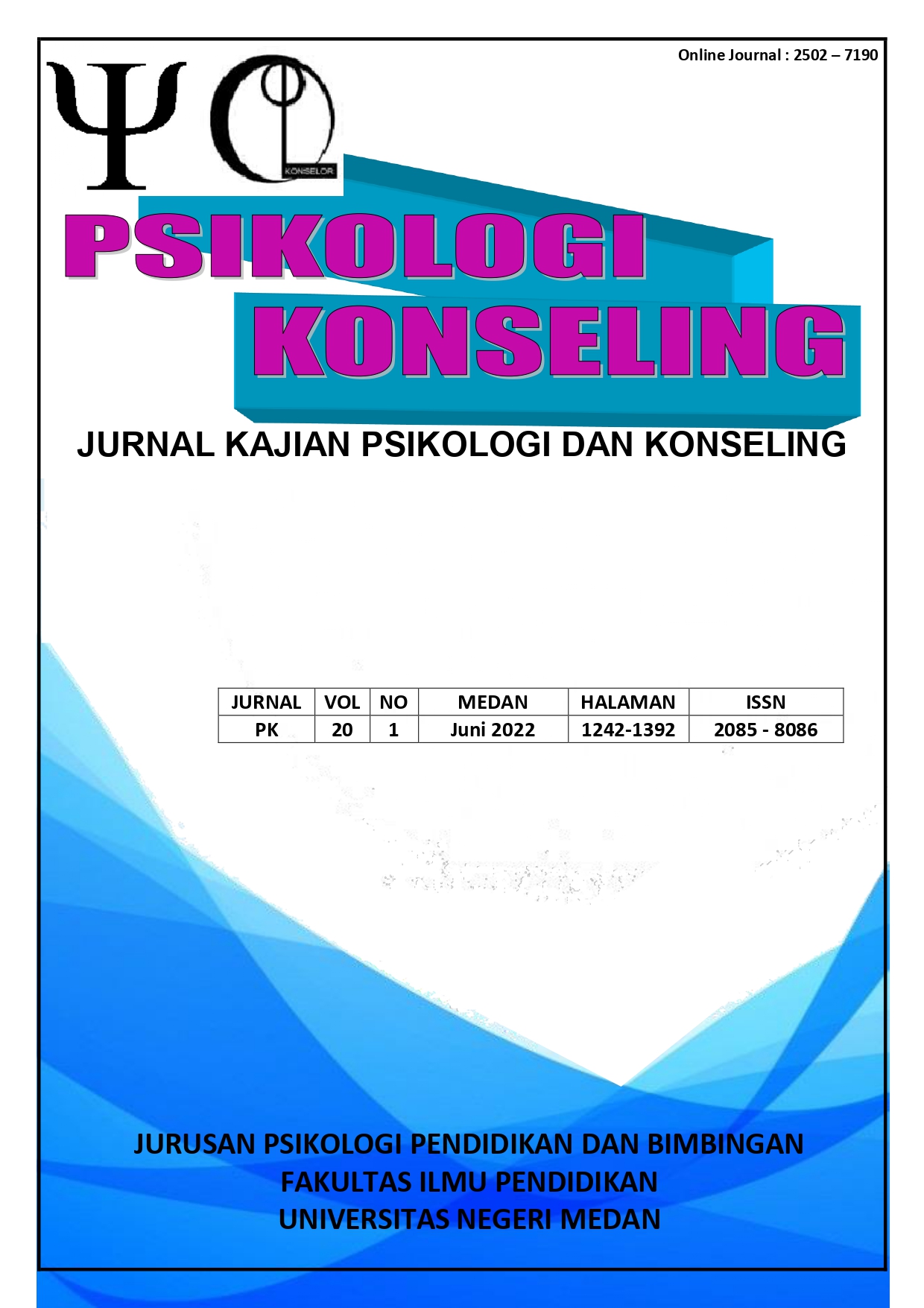Pelatihan Modal Psikologis untuk Meningkatkan Keterikatan Kerja pada Superintendent & Team Leader PT. XXX
DOI:
https://doi.org/10.24114/konseling.v20i1.36541Keywords:
Modal Psikologi, Psycap, Keterikatan KerjaAbstract
Keberhasilan proses produksi akan ditentukan oleh kemampuan seorang pemimpin seksi/regu dalam menjalankan tugasnya. Salah satu aspek yang dapat mempengaruhi keterikatan kerja dari pemimpin adalah Sumberdaya pribadi (personal resources) yang merupakan bentuk evaluasi diri positif yang dihubungkan dengan resiliensi dan merujuk kepada perasaan individu terhadap kemampuannya untuk mengontrol dan memberikan dampak terhadap situasi disekitarnya. Salah satu konsep yang dapat digunakan untuk menggambarkan aspek sumberdaya pribadi adalah modal psikologis (Psychological Capital/ PsyCap). Hasil observasi dan wawancara di PT. XXX menunjukkan bahwa peneliti mengindikasikan bahwa para pemimpin seksi/ regu cenderung kurang memiliki modal psikologis dalam melaksanakan perannya sebagai pemimpin. Berdasarkan hasil analisa kebutuhan yang telah dilakukan, maka peneliti akan mengadakan pelatihan tentang modal psikologis untuk meningkatkan keterikatan kerja pada pemimpin seksi/regu, dengan mengacu kepada 4 aspek/dimensi modal psikologis menurut Luthan, Youssef-Morgan, dan Avolio (2014). Berdasarkan hasil pelatitan didapatkan hasil bahwa skor pengetahuan karyawan meningkat namun kemampuan penerapan dan sikap belum mencerminkan aspek modal psikologi yang dilatihkan. Maka dapat disimpulkan bahwa pelatihan yang diberikan kepada peserta belum efektif untuk meningkatkan keterikatan kerja melalui modal psikologis.References
Albdour, A.A., & Altarawneh, I.I., (2014). Employee Engagement and Organizational Commitment. International Journal of Business Vol 19 (2).
Anitha, J. (2014). Determinants of Employee Engagement and Their Impact on Employee Performance. International Journal of Productivity and Performance Management. Vol. 63 (3)
Bakker, A.B., Demerouti, E., Sanz-Vergel, I.A. (2014). Burnout and Work Engagement : The JD-R Approach. Annual Review of Organizational Psychology and Organizational Behavior
Research, Bakker, A.B & Leiter, M.P (eds). New York : Psychology Press
Boamah, S., & Lachsinger, H. (2015) Engaging New Nurses : The Role of Psychological Capital and Workplace Empowerment. Journal of Research in Nursing Vol 20(4).
Costantinni, A., De Paola, F., Ceschi, A., Sartori, R., Meneghini, A.M., & Di Fabio, A. (2017) Work Engagement and Psychological Capital in the Italian Public Administration : A New Resource-Based Intervention Programme. SA Journal of Industrial Psychology Vol 43.
Demerouti, E., Bakker, A.B., Nachreiner, F., & Schaufeli, W.B. (2001). The Job Demands-Resources Model of Burnout. Journal of Applied Psychology Vol.86 (3) p499-512
Kahn, W.A. (1990). Psychological Condition of Personal Engagement and Disengagement at Work. Academy of Management Journal Vol 33 (4) p. 692 “ 724
Karatepe, O.M., & Karadas, G. (2015). Do Psychological Capital and Work Engagement Foster Frontline Employees™ Satisfaction?: A Study in the Hotel Industry. International Journal of Contemporaray Hospitality Management Vol 27(6)
Kirkpatrick, D.L., & Kirkpatrick, J.D. (2007). Implementing the Four Levels : A Practical Guide for Effective Evaluation of Training Programs. San Fransisco : Berrett-Koehler Publishers, Inc.
Lawson, K. (2006). The Trainer™s Handbook (2nd edition). San Fransisco : Pfeiffer
LePine, J.A., Podsakoff, N,P., & LePine, M.A. (2005). A Meta-analytic Test of the Challenge Stressor“Hindrance Stressor Framework : An Explanation for Inconsistent Relationship Among Stressors & Performance. Academy of Management Journal Vol 48(5)
Levene, R.A. (2015). Positive Psychology at Work : Psychological Capital and Thriving as Pathways to Employee Engagement. Diunduh dari http://repository.upenn.edu/mapp _capstone/88 pada 20 Oktober 2017
Nazir, O., & Islam, J.U. (2017). Enhancing Organizational Commitment and Employee Performance Through Employee Engagement : An Empirical Check. South Asian Journal of Business Studies Vol 6 (1)
Paek, S., Schuckert, M., Kim, T.T., & Lee, G. (2015). Why is Hospitality Employees™ Psychological Capital Important? The Effect of Psychological Capital on Work Engagement and Employee Morale. International Journal of Hospitality Management Vol 50.
Schaufeli, W.B., Salanova M., Gonzalez-Roma, V., & Bakker, A.B. (2002). The Measurement of Engagement and Burnout : A Two Sample Confirmatory Factor Analytic Approach. Journal of Happiness Studies Vol 3 p 71-92
Schaufeli, W.B. (2017). Applying the Job Demands “ Resources Model : A ˜how to™ Guide to Measuring and Tackling Work Engagement and Burnout. Organizational Dynamics Vol 46
Shuck, B., Reio Jr., T.G., & Rocco, T.S. (2011). Employee Engagement : An Examination of Antecedent and Outcome Variables. Human Resource Development International Vol 14(4)
Simons, J.C., & Buitendach, J.H. (2013). Psychological Capital, Work Engagement, and Organisational Commitment Amongst Call Centre Employees in South Africa. SA Journal of Industrial Psychology Vol 39 (2).
Van Wingerden, J., Bakker, A.B., & Derks, D. (2016). A Test of Job Demands-Resources Intervention. Journal of Managerial Psychology Vol 31(3) p 686 “ 701
Xanthopoulou, D., Bakker, A.B., Demerouti, E., & Schaufeli, W.B. (2009). Reciprocal Relationships between Job Resources, Personal Resources, and Work Engagement.
Xanthopoulou, D., Bakker, A.B., Demerouti, E., & Schaufeli, W.B. (2007). The Role of Personal Resources in the Job Demands-Resources Model. International Journal of Stress Management Vol 14 (2) p121-1
Downloads
Published
How to Cite
Issue
Section
License
Copyright (c) 2022 Christy Margareth

This work is licensed under a Creative Commons Attribution-ShareAlike 4.0 International License.
This work is licensed under a Creative Commons Attribution-ShareAlike 4.0 International License.




